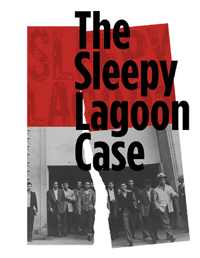|

 uring the trial, labor activist La Rue McCormick had established
an ad-hoc committee to publicize the events surrounding the case.
After the defendants were sentenced, the committee was reorganized
as the Sleepy Lagoon Defense Committee (SLDC), with Carey McWilliams
as its chair and Alice McGrath (then Greenfield) as executive secretary.
Alice McGrath describes the reorganization of the committee and
its focus as follows: uring the trial, labor activist La Rue McCormick had established
an ad-hoc committee to publicize the events surrounding the case.
After the defendants were sentenced, the committee was reorganized
as the Sleepy Lagoon Defense Committee (SLDC), with Carey McWilliams
as its chair and Alice McGrath (then Greenfield) as executive secretary.
Alice McGrath describes the reorganization of the committee and
its focus as follows:
After the convictions the committee was reorganized as the Sleepy
Lagoon Defense Committee with Carey McWilliams as the national
chairman. The committee and its supporters included constitutional
rights advocates, labor, church groups, the political left, community
organizations, and individuals throughout the country.
The Sleepy Lagoon Defense Committee defined its project clearly:
it was to publicize the injustice of the trial and raise money
to fund the appellate process on behalf of the twelve.
Alice Greenfield McGrath. 3-page 'recollections'; 1-page
chronology.
Alice Greenfield McGrath Papers.
In his 1982 UCLA oral history interview with Joel Gardner, Carey
McWilliams also commented:
The trial had taken place in a poisonous atmosphere. Then when
they were convicted, this defense group realized they had to do
something else. They were at the end of their non-existent resources.
So they came to me and wanted to know if I would take over the
chairmanship of the committee to raise funds for the appeal. It
was necessarily going to be a long, drawn-out affair, costly,
very costly affair, big 6,000-page transcript, all this sort of
thing. New counsel would be needed. So I said I would, but I wanted
to make it clear that the committee would have to be broadened,
because there was no way of raising the money that was needed
with that committee; it was too narrow. You'd have to have some
labor people on it, some prominent Jewish businessmen, and motion
picture people, and some blacks, one or two blacks (there were
a few Mexican-American middle-class persons that we could get),
and the personnel itself would have to change on the committee.
So they agreed to all of this. Oh, yes, I made a further condition.
I said every penny collected in the name of the committee would
have to be recorded, and the expenditures recorded, and those
records have to be certified by an auditor, and they have to be
deposited in a safe place like the UCLA Library, so that they
might be inspected by anyone with a legitimate interest.
Honorable in all things oral history transcript: the memoirs
of Carey McWilliams. UCLA oral history, 1978.
|

![]()



 uring the trial, labor activist La Rue McCormick had established
an ad-hoc committee to publicize the events surrounding the case.
After the defendants were sentenced, the committee was reorganized
as the Sleepy Lagoon Defense Committee (SLDC), with Carey McWilliams
as its chair and Alice McGrath (then Greenfield) as executive secretary.
Alice McGrath describes the reorganization of the committee and
its focus as follows:
uring the trial, labor activist La Rue McCormick had established
an ad-hoc committee to publicize the events surrounding the case.
After the defendants were sentenced, the committee was reorganized
as the Sleepy Lagoon Defense Committee (SLDC), with Carey McWilliams
as its chair and Alice McGrath (then Greenfield) as executive secretary.
Alice McGrath describes the reorganization of the committee and
its focus as follows: